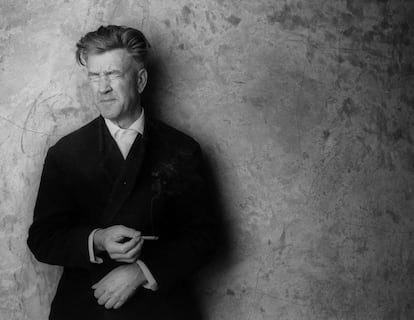When David Lynch embarked on his biography in 2017, he did so lynchianamente: The journalist Kristine McKenna faced, speaking with more than 100 people, the writing of the usual biographical story, and after each episode, Lynch dove into hers, erecting her memories from her emotions: “Using the memories of others to unearth the mine, I wrote my own chapter.” And he explained: “Human consciousness is too vast to be confined within the covers of a book, and each experience has too many elements to take into account. In short, we aspired for this biography to be definitive, but it remains a mere sketch.”
After masterpieces in cinema like The elephant man (1980), blue velvet (1986), lost road (1997) o Mulholland Drive (2001), and on television as Twin Peaks (1989 and 2017), after 23 exhibitions, 35 audiovisual works of different formats and recording eight albums, after succeeding online with his daily weather report, his short films and his passion for meditation, one of his last tricks was that book , Space to dream (Reservoir Books), another example of his soul as a conjurer and illusionist. Because everyone sees what they want to see: Lynch shows the viewer what he wants them to see, while the audience probably believes that they are seeing something else, and in reality a third thing is happening. The cinematic Holy Spirit.
Few filmmakers have explored the frontiers of audiovisual, without leaving a certain industrial orthodoxy, like David Lynch. His films ended up being financed in France, but all over the world there are fans of the creator who, nevertheless, understood the game of formats, of how to make seemingly commercial series and films and then steal the soul of the viewer. Mel Brooks, the comedian, hired him to The elephant man, because he saw eraser head in a move that made him one of the first abductees by the filmmaker. After the screening, he rushed out to Lynch, hugged him and said: “You’re crazy. I love you!”. After Brooks, millions of others have felt the same: always at the side of the creator who disturbs human beings.
Mel Brooks went to an ‘Eraserhead’ pass. When he finished, he ran out, hugged Lynch and told him: “You’re crazy. I love you!”
His biographer wrote: “Before David, no one put together the sad and the funny, or mixed the terrifying with the hilarious, or the sexual with the strange.” To which Lynch, who never understood explanations or begging rationalities, responded by telling how he bought a mackerel from a fishmonger to dissect it and begin what he calls for years. animal kit —“It’s just that I’m obsessed with textures”—, or that he attended the birth of his first child (Jennifer) “because I wanted to see.” You were never attracted to your own legend, you were only interested in maintaining creative control. He never left aside what surrounded him, although he always perceived it, captured it and heard it through his eyes. What for the rest was an enigma, for Lynch were neural connections that happened to him, organically.
Only once – apparently – did he give in to the opinion that many have of his work: when in lost road you hear David Bowie sing I’m Deranged (I am deranged): “Narrow heavens, the man chains his hands on high / Walk me fool, walk me darling / A foolish belief beyond, beyond, beyond / No return, no return.” Lynch has been emperor of our Earth and its sky. With his passing, now, everything is one.

